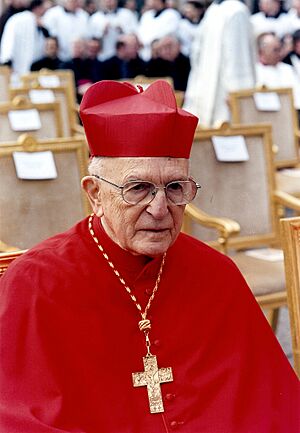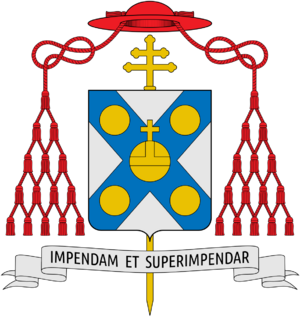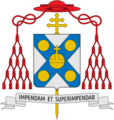Eugênio Sales facts for kids
Quick facts for kids His Eminence Eugênio Sales |
|
|---|---|
| Cardinal, Archbishop Emeritus of Rio de Janeiro |
|
 |
|
| Church | Roman Catholic Church |
| Archdiocese | São Sebastião do Rio de Janeiro |
| See | São Sebastião do Rio de Janeiro |
| Appointed | 13 March 1971 |
| Reign ended | 25 July 2001 |
| Predecessor | Jaime de Barros Câmara |
| Successor | Eusébio Scheid |
| Other posts |
|
| Orders | |
| Ordination | 21 November 1943 |
| Consecration | 15 August 1954 by José de Medeiros Delgado |
| Created Cardinal | 28 April 1969 |
| Rank | Cardinal-priest |
| Personal details | |
| Birth name | Eugênio de Araújo Sales |
| Born | 8 November 1920 Acari, Rio Grande do Norte Brazil |
| Died | 9 July 2012 (aged 91) Rio de Janeiro, Brazil |
| Buried | Rio de Janeiro Cathedral |
| Parents | Celso Dantas Sales Josefa de Araujo Sales |
| Previous post |
|
| Motto | Impendam et superimpendar |
| Coat of arms |  |
Eugênio de Araújo Sales (born November 8, 1920 – died July 9, 2012) was an important leader in the Roman Catholic Church. He became a Cardinal in 1969, chosen by Pope Paul VI. For thirty years, he served as the archbishop of Rio de Janeiro. He was also the longest-serving living Cardinal from 2009 until his death.
Contents
Early Life and Becoming a Priest
Eugênio Sales was born in Acari, Rio Grande do Norte, Brazil. His family was well-known. His father, Celso Dantas Sales, was a judge.
Eugênio studied as a teenager and joined a seminary in 1936. A seminary is a school where people train to become priests. He continued his studies in Fortaleza from 1937 to 1943.
He became a priest on November 21, 1943. For the next ten years, he worked with people in the Archdiocese of Natal.
Becoming a Bishop
In 1954, Pope Pius XII chose Sales to become a titular bishop. This means he was given the title of a bishop for a place called Thibica. He also became an auxiliary bishop for Natal. An auxiliary bishop helps the main bishop.
Sales officially became a bishop on August 15, 1954.
In 1962, Pope John XXIII made Sales an Apostolic Administrator for Natal. This role meant he managed the church area. Later, in 1964, Pope Paul VI moved him to São Salvador da Bahia in a similar role.
Bishop Sales attended all meetings of the Second Vatican Council from 1962 to 1965. This was a very important meeting for the Catholic Church.
In 1968, Sales became the Archbishop of São Salvador da Bahia. This made him the main leader of the Church in Brazil.
Becoming a Cardinal
| Styles of Eugênio de Araújo Sales |
|
|---|---|
 |
|
| Reference style | His Eminence |
| Spoken style | Your Eminence |
| Informal style | Cardinal |
| See | São Sebastião do Rio de Janeiro (emeritus) |
On April 28, 1969, Pope Paul VI made Archbishop Sales a Cardinal of the Holy Roman Church. Cardinals are high-ranking officials in the Catholic Church. They help the Pope.
Two days later, Cardinal Sales received his red hat, called a biretta. He was given the title of Cardinal-Priest of S. Gregorio VII.
In 1970, Cardinal Sales was chosen by the Pope to lead a big church event in Brasília. It was called the Brazilian National Eucharistic Congress.
On March 13, 1971, Pope Paul VI moved Sales to become the Archbishop of Rio de Janeiro. He started his new role on March 27, 1971. In 1972, he also became responsible for Catholics in Brazil who follow Eastern Christian traditions.
As a Cardinal, Sales helped choose a new Pope. He took part in the August and October 1978 conclaves. A conclave is when Cardinals meet to elect a new Pope.
Sales led the Archdiocese of Rio de Janeiro for thirty years, from 1971 to 2001.
He was also part of a group of Cardinals that looked at how the Holy See (the Pope's government) was organized and managed money.
While in Rio, Sales attended many important church meetings. These included meetings of the Synod of Bishops and conferences for Latin American bishops.
In 1997, Pope John Paul II chose him to lead a special meeting of bishops for America.
Cardinal Sales also represented the Pope on several special occasions. For example, in 1991, he led a big church event in Natal. In 2004, after he retired, he represented the Pope at celebrations in Aparecida, Brazil. He also traveled to Portugal in 2004 for another special event.
Even after retirement, Sales attended important meetings called by Pope Benedict XVI. These meetings were for all Cardinals to pray and reflect.
Retirement
When Sales turned 75 in 1995, he offered to resign as Archbishop of Rio de Janeiro. This is a rule in the Catholic Church. Pope John Paul II finally accepted his resignation on July 25, 2001.
By this time, Sales was over 80 years old. This meant he could no longer vote in a papal conclave. It was very unusual for him to continue as Archbishop after turning 80.
After his resignation was accepted, Sales continued to manage the Rio de Janeiro church area. He did this until his replacement took over in September 2001. His full retirement was complete in October 2001.
When Pope John Paul II died in 2005, Sales was the second-longest-serving Cardinal. Even though he couldn't vote in the 2005 Papal conclave, he was important in the discussions before it. He led one of the funeral masses for the Pope. He also signed a special document placed inside the Pope's coffin.
In February 2009, Sales became the protoprete Cardinal. This means he was the longest-serving Cardinal-Priest. He was also the longest-serving living Cardinal in the Catholic Church. On April 28, 2009, he had been a Cardinal for 40 years.
In November 2010, the Archdiocese of Rio de Janeiro celebrated his 90th birthday. By then, he was the last living Cardinal created in 1969.
Even in retirement, Sales stayed active. He wrote a weekly article about faith for a newspaper called O Globo. He did this for 40 years. He also often celebrated Mass at a church in Ipanema.
In May 2011, he stopped writing his weekly articles. The current Archbishop of Rio de Janeiro, Orani João Tempesta, took over this task.
Death
Cardinal Sales died peacefully in his sleep on July 9, 2012. He was 91 years old and died from a heart attack. His funeral was held on July 11, 2012, in Rio de Janeiro.
Views and Actions
Standing Up for Human Rights
As Archbishop of Rio de Janeiro from 1971, Cardinal Sales spoke out against human rights problems in Brazil. This was during a time when the country was ruled by the military (1964-1985). He worked to help people who were treated unfairly by the government. Historians have recently recognized his important work during this period.
Upholding Catholic Teachings
After the military rule ended, Cardinal Sales became a strong voice in Brazil for Catholic moral teachings. He worked to make sure people followed the Church's beliefs. He tried to guide people to live according to Catholic values.
See also
 In Spanish: Eugênio de Araújo Sales para niños
In Spanish: Eugênio de Araújo Sales para niños
Images for kids



